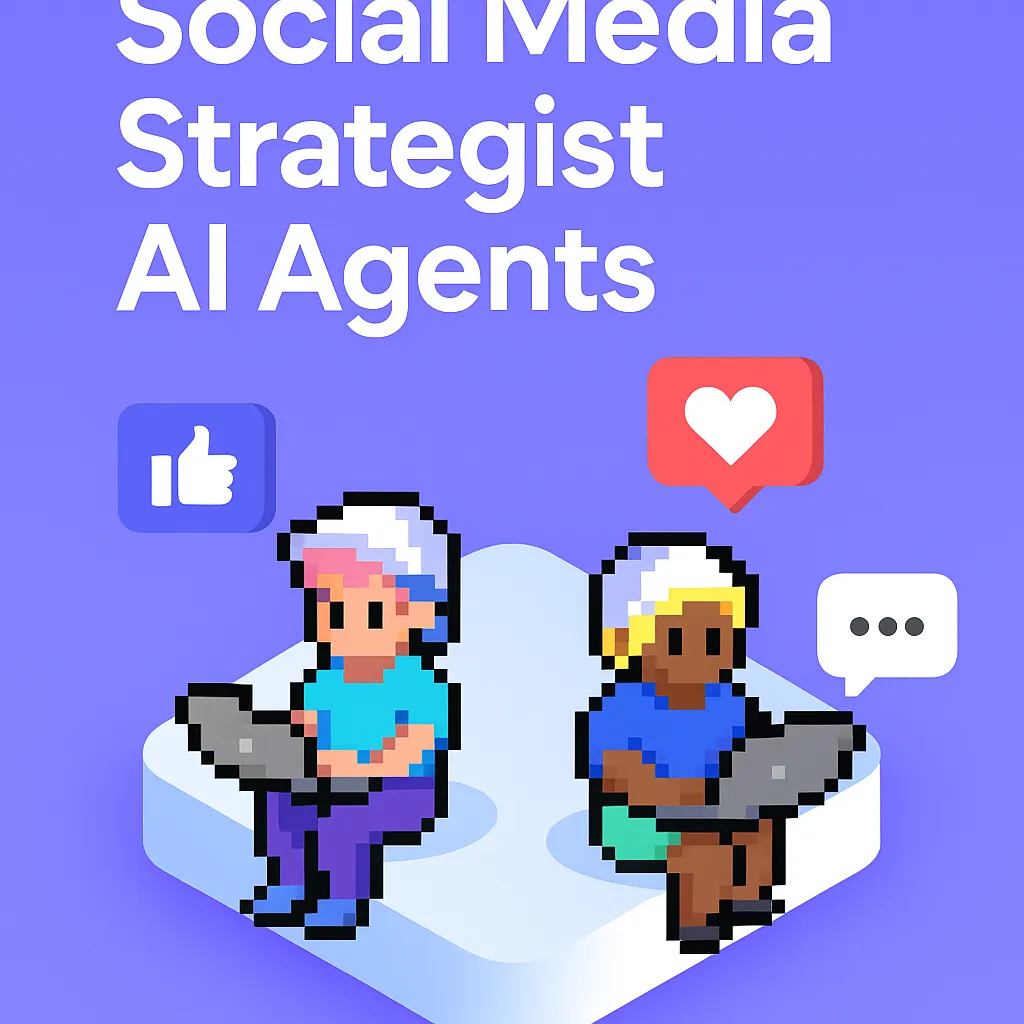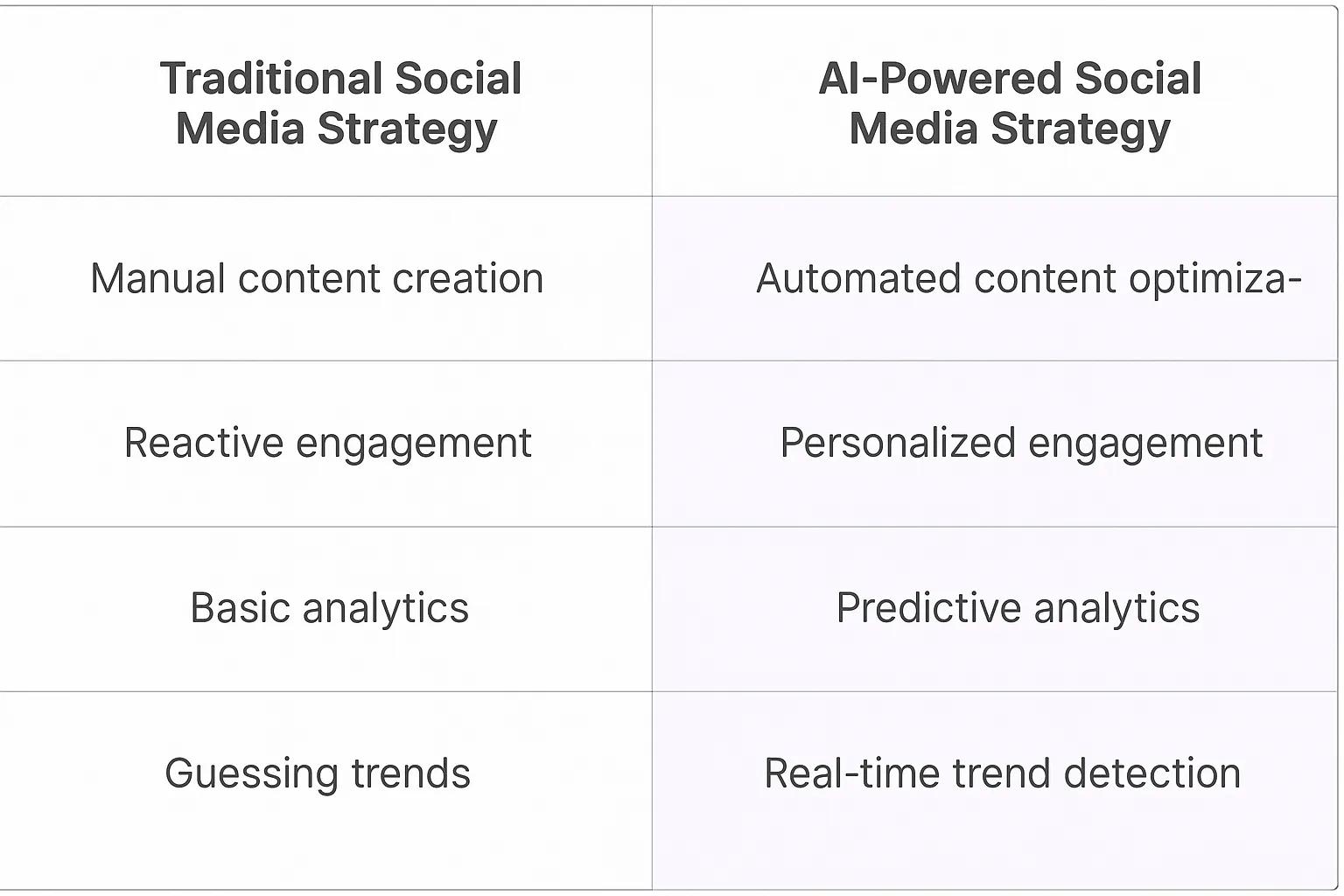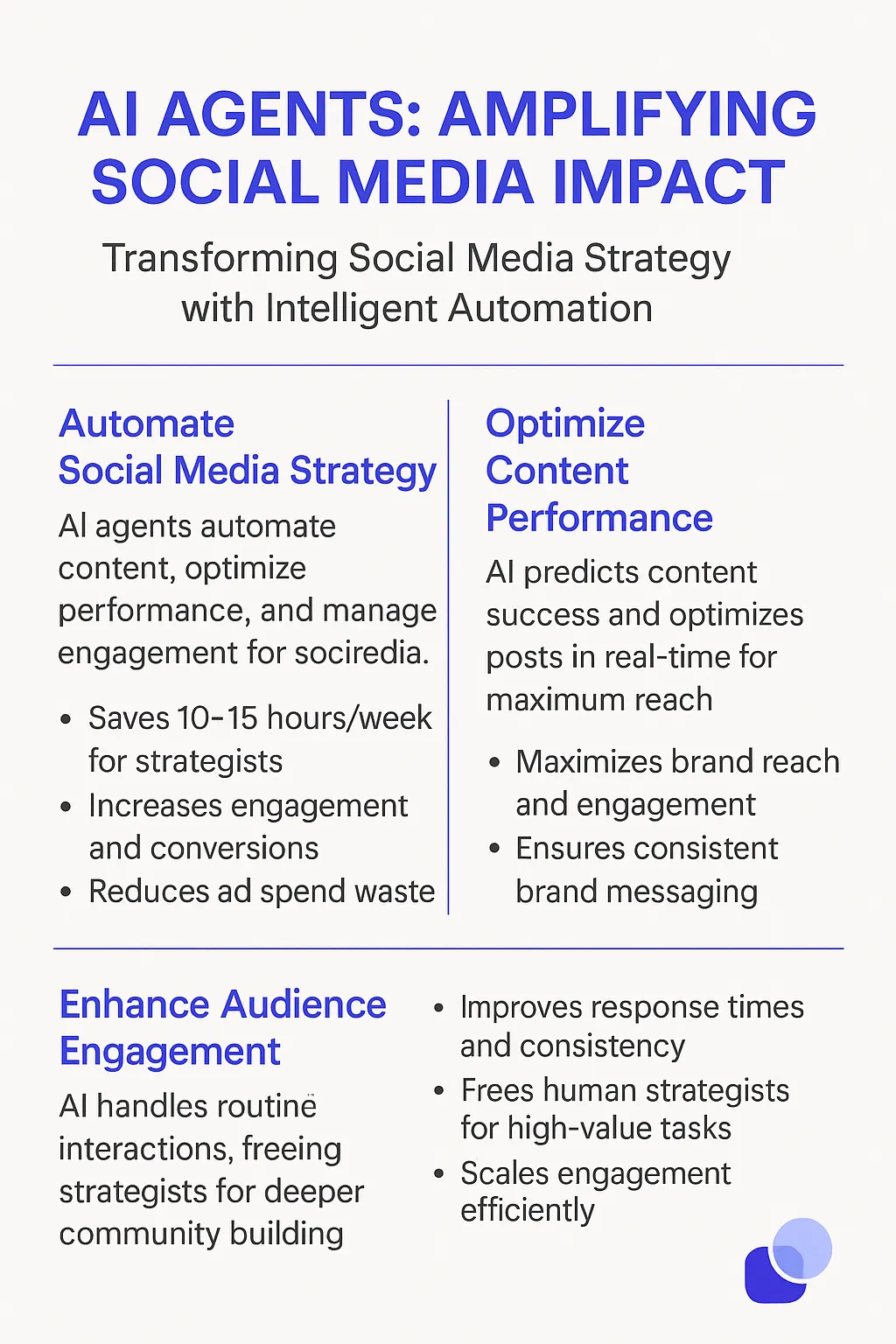A Social Media Strategist is a digital marketing professional who crafts and executes strategies to build brand presence, engage audiences, and drive business goals through social media platforms. They're the architects of a brand's online persona, blending creativity with data-driven decision-making to create content that resonates and converts.
The integration of AI agents into social media strategy brings a suite of game-changing features:1. Predictive Analytics: AI crunches vast datasets to forecast content performance and audience behavior.2. Automated Content Creation: Generates ideas and drafts posts, freeing strategists to focus on high-level creativity.3. Real-Time Optimization: Continuously monitors performance and adjusts strategies on the fly.4. Personalization at Scale: Tailors content to individual audience segments without manual intervention.5. Trend Detection: Identifies emerging conversations and hashtags before they peak.6. 24/7 Engagement: Manages interactions and basic customer service around the clock.7. Cross-Platform Coordination: Ensures cohesive messaging across multiple social networks while adapting to each platform's nuances.

Before AI agents entered the scene, social media strategists were like lone wolves howling into the digital void. They'd spend countless hours manually crafting posts, analyzing engagement metrics, and trying to decipher the ever-changing algorithms of social platforms. It was a grind – one that often led to burnout and suboptimal results.
The typical toolkit included a mishmash of scheduling tools, analytics platforms, and good old-fashioned guesswork. Strategists would rely heavily on their intuition, past experiences, and whatever trends they could spot. But in the fast-paced world of social media, this approach was like trying to predict the weather by looking out the window – sometimes you'd get it right, but often you'd be caught in a storm without an umbrella.
Enter AI agents – the game-changers that are redefining what it means to be a social media strategist. These digital teammates are like having a team of data scientists, content creators, and trend analysts at your fingertips 24/7. Here's why they're causing such a stir:
1. Predictive Analytics on Steroids: AI agents can crunch massive amounts of data to predict content performance with uncanny accuracy. They're not just looking at likes and shares; they're analyzing sentiment, timing, and even the nuances of language that resonate with specific audience segments. This level of insight allows strategists to craft content that's practically guaranteed to hit the mark.
2. Content creation at Scale: Writer's block? That's so 2020. AI agents can generate ideas, draft posts, and even create visuals that align with brand guidelines. This doesn't mean replacing human creativity – it's about augmenting it. Strategists can focus on high-level strategy while their AI sidekick handles the heavy lifting of content production.
3. Real-Time Optimization: Social media moves at the speed of light, and AI agents are built to keep up. They can monitor performance in real-time and make micro-adjustments to content strategy on the fly. Did a post unexpectedly go viral? The AI can immediately capitalize on that momentum, suggesting follow-up content or adjusting ad spend to ride the wave.
4. Personalization at Scale: Gone are the days of one-size-fits-all social media strategies. AI agents can segment audiences with surgical precision and tailor content to resonate with each group. It's like having a personal social media concierge for every single follower – without the need for an army of human strategists.
5. Trend Surfing: AI agents are like social media surfers, always catching the next big wave before it crests. They can identify emerging trends, hashtags, and conversations faster than any human could, allowing strategists to position their brands at the forefront of cultural moments.
6. 24/7 Engagement: Social media never sleeps, and neither do AI agents. They can manage customer interactions, moderate comments, and even handle basic customer service inquiries around the clock. This constant engagement keeps the brand's social presence active and responsive, even when the human team is offline.
7. Cross-Platform Synergy: Managing multiple social platforms can feel like juggling flaming torches. AI agents excel at coordinating strategies across different networks, ensuring a cohesive brand message while adapting content to the unique quirks of each platform.
The bottom line? AI agents are transforming social media strategists from reactive content pushers to proactive brand orchestrators. They're not replacing the human touch – they're amplifying it, allowing strategists to operate at a level of sophistication and scale that was previously unimaginable. In the attention economy, where every scroll and tap counts, AI agents are the secret weapon that's giving savvy brands the edge.

Social media strategists are constantly juggling multiple platforms, content types, and audience segments. AI agents can transform how these professionals approach their work, making their efforts more targeted and impactful. Let's dive into some key processes where AI can make a significant difference:
Beyond high-level processes, AI agents can handle numerous day-to-day tasks that consume a social media strategist's time. Here are some examples:
The integration of AI agents into social media strategy isn't about replacing human creativity or intuition. Instead, it's about augmenting these uniquely human qualities with data-driven insights and automation of repetitive tasks. This allows social media strategists to focus on high-level strategy, creative ideation, and building genuine connections with their audience.
As we move forward, the most successful social media strategists will be those who can effectively collaborate with AI agents, leveraging their capabilities to create more impactful, engaging, and authentic social media presences for their brands. The future of social media strategy isn't human vs. machine - it's human and machine, working in concert to navigate the ever-evolving social media landscape.

The social media landscape is a constantly shifting terrain, and AI agents are becoming the secret weapon for savvy strategists. These digital teammates aren't just tools; they're game-changers that are reshaping how brands connect with their audiences across platforms. Let's dive into some industry-specific scenarios where these AI agents are making waves and driving results that would make even the most seasoned social media pros do a double-take.
From e-commerce giants fine-tuning their product drops to non-profits amplifying their message, AI agents are the behind-the-scenes MVPs. They're not just scheduling posts or tracking likes – they're analyzing sentiment, predicting trends, and crafting content that resonates on a whole new level. We're talking about AI that can read the room (or in this case, the feed) and adjust strategy in real-time.
So, buckle up as we explore how these AI-powered strategists are becoming indispensable across various sectors, proving that in the world of social media, the future isn't just coming – it's already here, one smart post at a time.
The retail industry is a battleground of attention, and social media is the frontline. Enter the Social Media Strategist AI Agent – a digital teammate that's about to flip the script on how retail brands engage with their audience.
Think about the typical retail social media strategy. It's often a mix of product showcases, seasonal promotions, and the occasional user-generated content. But what if we could take this to the next level? That's where our AI agent steps in.
This digital strategist doesn't just post content; it orchestrates a symphony of engagement. It analyzes trending hashtags, consumer sentiment, and competitor activity in real-time. Then, it crafts posts that hit the sweet spot between brand voice and what's buzzing in the zeitgeist.
But here's where it gets interesting. The AI doesn't stop at posting. It's constantly learning from engagement metrics, fine-tuning its approach. It might notice that posts about sustainable packaging are resonating more than expected. Boom – it adjusts the content calendar to double down on eco-friendly messaging.
The real magic happens in the personalization. This AI can segment followers based on their interaction history and preferences. A sneakerhead who always likes limited edition drops? They'll see more exclusive previews. A budget-conscious shopper who engages with sales posts? They'll get first dibs on flash sale announcements.
And let's talk about crisis management. Remember those PR nightmares that spiral out of control on Twitter? Our AI agent is on it 24/7, detecting potential issues before they blow up. It can draft responses for human approval, ensuring the brand stays ahead of the conversation.
The result? A retail brand that feels omnipresent yet personal. Customers aren't just following a store; they're part of a dynamic community. And for the brand, it's like having a social media team that never sleeps, always adapts, and knows each follower like a friend.
This isn't just about more likes or shares. It's about creating a digital presence that translates directly to foot traffic and online sales. It's the difference between a brand that talks at its customers and one that converses with its community.
In the end, the Social Media Strategist AI Agent isn't replacing human creativity in retail – it's amplifying it. It's giving brands the power to be in a million conversations at once, each one feeling as personal as a chat with a favorite store clerk. That's not just good social media; that's the future of retail engagement.
The travel industry is ripe for disruption, and Social Media Strategist AI Agents are the secret weapon that's about to redefine how we dream, plan, and share our adventures. Let's dive into how these digital teammates are transforming the way travel brands connect with wanderlusters.
Travel is inherently visual and experiential – perfect for social media. But most travel companies are still stuck in the "post pretty picture, add generic caption" loop. The AI agent breaks this cycle by creating a narrative that follows the traveler's journey from inspiration to booking to experience and beyond.
Here's where it gets interesting: the AI doesn't just curate content; it creates personalized travel stories. By analyzing user data, it can identify which destinations are trending among different demographics. A millennial who's been eyeing Bali? The AI serves up a series of Instagram Reels showcasing hidden gems, each one feeling like a personal recommendation from a well-traveled friend.
But the real power move is in the AI's ability to tap into micro-moments. It knows when someone's dreaming of a beach escape during a stressful workweek or planning a last-minute weekend getaway. The AI then pushes tailored content at just the right time – maybe a Thursday afternoon tweet about a flash sale on beachfront hotels.
The AI also becomes a virtual travel companion. It can aggregate and repost user-generated content in real-time, creating a living, breathing travel guide. Imagine landing in Tokyo and your feed instantly populates with the hottest ramen spots, as recommended by travelers who were there just hours ago.
Here's where the AI flexes its muscles in community building. It identifies potential travel buddies based on shared interests and destinations, fostering connections that could lead to group bookings. It's not just selling trips; it's creating a tribe of like-minded explorers.
And let's talk about crisis management – crucial in the travel industry. The AI monitors global events, travel advisories, and even weather patterns. If there's a transportation strike in Paris, it immediately adjusts content for affected travelers, offering alternative itineraries or local insights to navigate the situation.
The result? A travel brand that feels less like a faceless corporation and more like a savvy globetrotter friend. It's not just pushing destinations; it's curating experiences, solving problems, and igniting the travel bug in ways that feel deeply personal.
This AI-driven approach isn't just about increasing bookings (though it does that too). It's about creating a continuous loop of inspiration, planning, experiencing, and sharing that keeps travelers engaged long after they've unpacked their suitcases.
In the end, the Social Media Strategist AI Agent in travel isn't replacing the human touch – it's amplifying it to a global scale. It's giving travel brands the ability to be the ultimate travel companion: always there, incredibly knowledgeable, and perfectly in tune with each traveler's desires. That's not just smart marketing; it's the future of how we'll explore the world.
Implementing a Social Media Strategist AI Agent isn't just about slapping some algorithms together and calling it a day. We're talking about building a digital teammate that can navigate the ever-shifting landscape of social media trends, user behavior, and platform algorithms. It's like trying to hit a moving target while riding a unicycle.
First off, we need to tackle the beast that is natural language processing. Our AI needs to understand the nuances of human communication across different platforms. It's not just about decoding emojis and hashtags; it's about grasping context, sarcasm, and cultural references. This requires a robust machine learning model that can continuously adapt to new linguistic patterns and internet slang.
Then there's the challenge of real-time data processing. Social media moves at the speed of light, and our AI needs to keep up. We're talking about ingesting and analyzing massive amounts of data from multiple platforms simultaneously. This requires a scalable infrastructure that can handle sudden spikes in activity without breaking a sweat.
Let's not forget about the AI's decision-making capabilities. It needs to make split-second choices about what content to post, when to post it, and how to engage with followers. This involves complex predictive modeling and a deep understanding of each platform's unique ecosystem. We're essentially trying to bottle the intuition of a seasoned social media expert and turn it into code.
On the operational side, we're entering uncharted territory. Integrating an AI Social Media Strategist into existing workflows is like trying to teach a robot to dance at a human party. It's going to be awkward at first, and there will be some stepped-on toes.
One of the biggest hurdles is getting human team members to trust and collaborate with their new digital teammate. There's often a knee-jerk resistance to AI in creative fields, and social media strategy is no exception. We need to focus on creating a symbiotic relationship where the AI enhances human creativity rather than replacing it.
Then there's the question of accountability. When an AI makes a social media faux pas (and it will), who takes the fall? We need clear protocols for oversight and error correction. This isn't just about damage control; it's about creating a feedback loop that helps the AI learn and improve over time.
We also can't ignore the ethical implications. An AI Social Media Strategist will have access to vast amounts of user data. We need robust safeguards to ensure privacy and prevent misuse. Plus, we need to be transparent about when followers are interacting with an AI versus a human. The last thing we want is to erode trust in the very platforms we're trying to optimize.
Finally, there's the challenge of keeping the AI up-to-date with the latest platform changes and features. Social media platforms are constantly evolving, and our AI needs to evolve with them. This requires a dedicated team of developers and strategists working in tandem to ensure the AI remains cutting-edge and effective.
Implementing a Social Media Strategist AI Agent is a complex undertaking that requires a delicate balance of technical innovation and human oversight. But for those who can navigate these challenges, the potential rewards in terms of engagement, reach, and ROI are enormous. It's not about replacing human creativity, but about amplifying it to new heights.
The fusion of AI agents with social media strategy isn't just an incremental improvement—it's a quantum leap. We're witnessing the birth of a new paradigm where human creativity is amplified by machine intelligence, resulting in social media campaigns that are more targeted, responsive, and effective than ever before.
The strategists who embrace this AI-powered future won't be replaced; they'll be supercharged. They'll operate at a level of sophistication and scale that was previously unimaginable, crafting narratives that resonate on a deeply personal level with millions of followers simultaneously.
As we look ahead, the most successful brands will be those that master this human-AI collaboration, creating social media presences that feel omnipresent yet intimately personal. In this new landscape, every post, every interaction, and every campaign will be an opportunity to forge deeper connections and drive real business impact.
The future of social media strategy is here, and it's powered by AI. Those who adapt will thrive; those who don't risk being left behind in the scrolling feed of history.